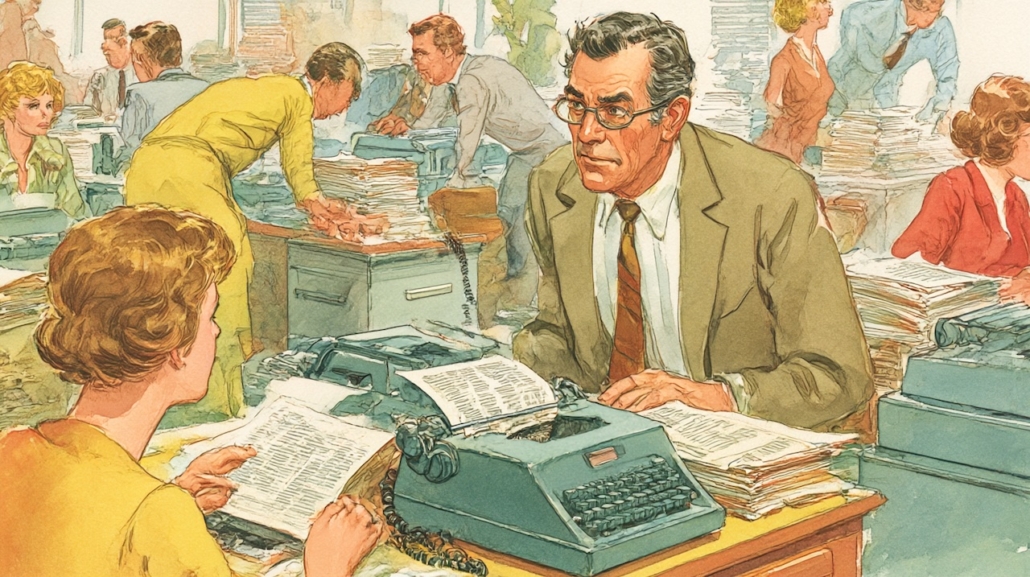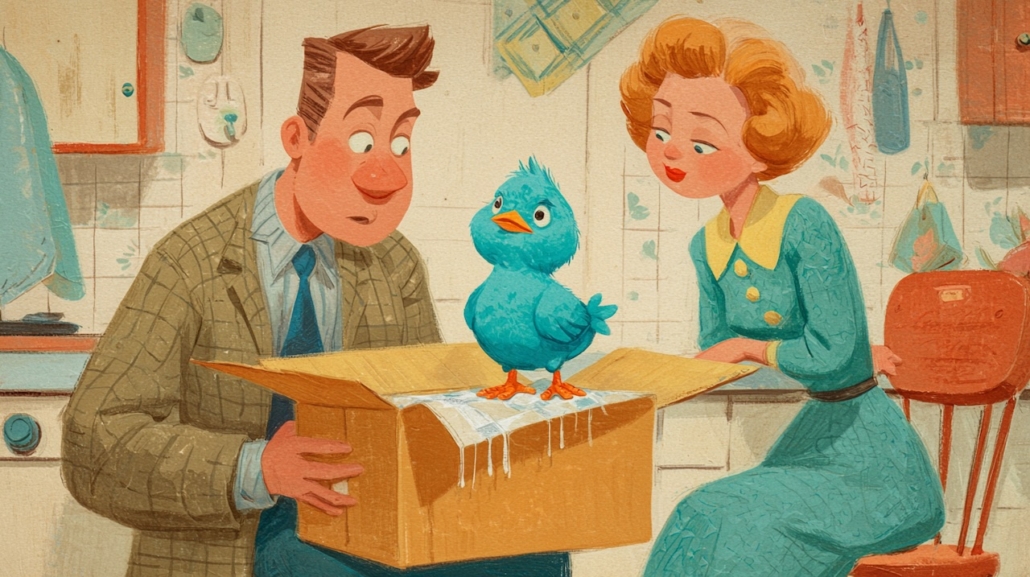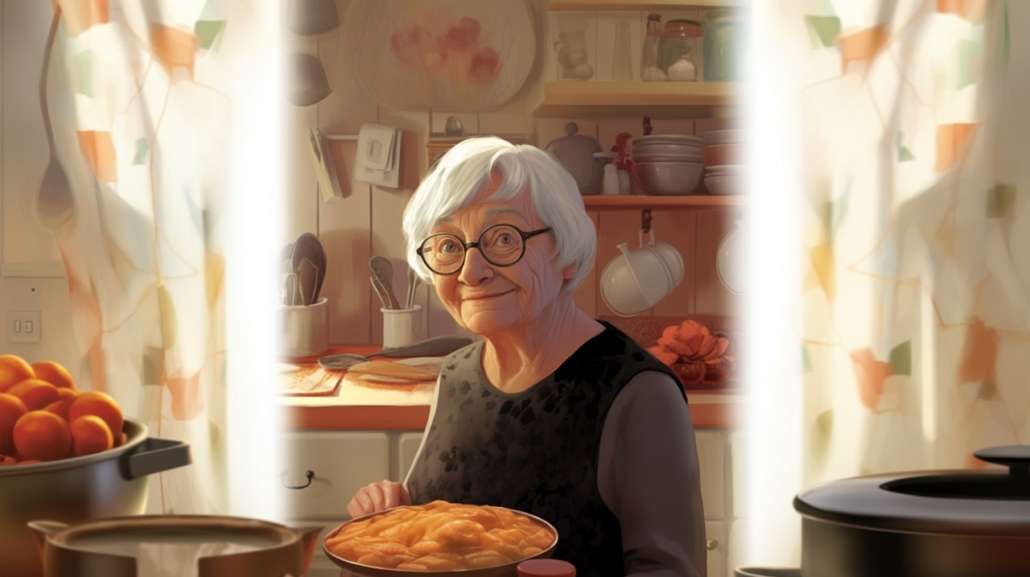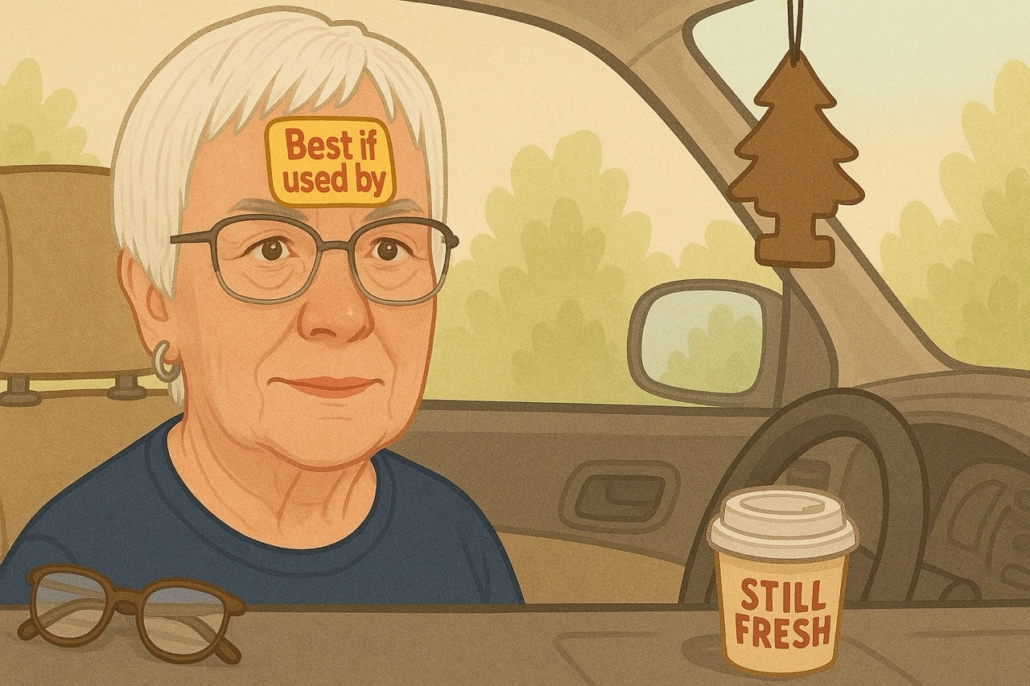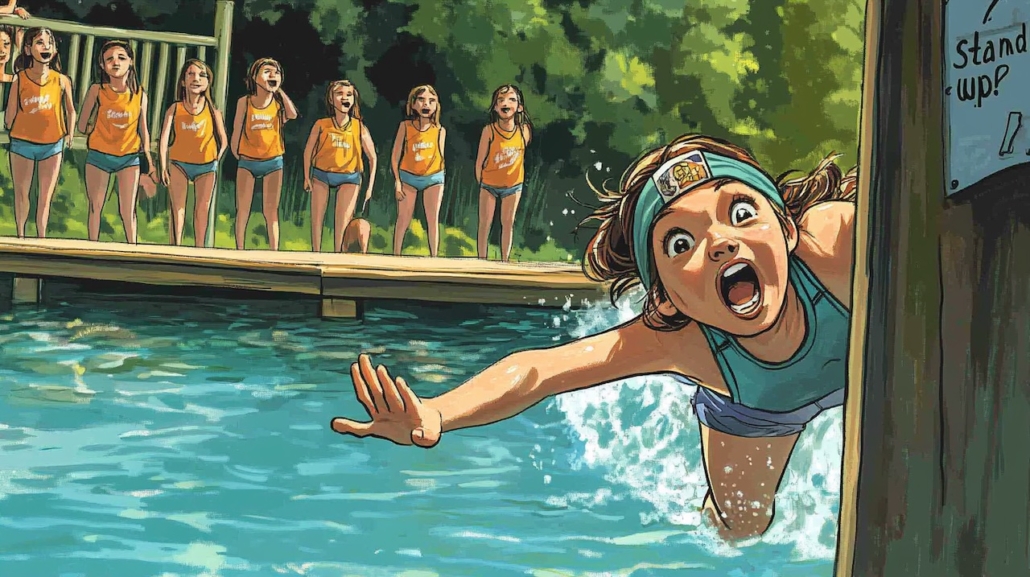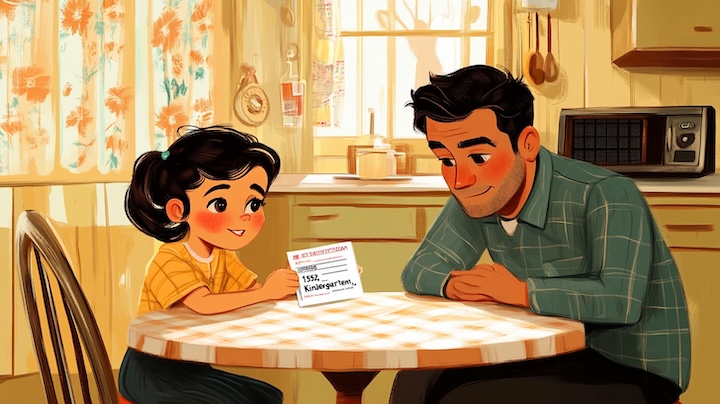I remember the day; I remember the hour; I even remember the skipped heartbeat when I first heard my six-year-old son Alan’s words: “I want to be a hockey player.”
Translation – You can be my hockey mom.
* * * * * *
“I have to teach him to skate?” I asked my husband. “You’re the athlete in the family—you teach him to skate.”
“You teach him to skate,” he said, “and I’ll teach him to play hockey.”
“Why me? Remember, I’m the one who took dancing lessons because I was so clumsy and at age five sat on my thumb and broke it and couldn’t be in the recital.”
“So?” he answered. “You were a cheerleader.”
“But I only did that to get into the games for free.”
“Skating is great exercise,” he added.
“This was my last rational plea. “But I’m Mrs. Couch Potato!”
Smiling, he answered, “I rest my case.”
* * * * * *
“My, God, he skates just like you.”
I had warned him, right? Hadn’t I warned him?
One year of intensive training, a frostbitten nose, frostbitten toes, a thousand miles on the car and another five thousand miles on my ice skates, not to mention the wear and tear on my body and all he could say was, “My, God, he skates just like you.”
What did I learn from this experience? I learned two things: one, once a couch potato always a couch potato and two, when you sit on your thumb at age five, it takes only six weeks to heal, but when you sit on our thumb at age 30, it takes six months to heal.
* * * * * *
“Hey, Mom, I’m on a hockey team. I’m number 6.”
Translation – He can now skate up and down the ice using a cutoff $20 hockey stick as a lethal weapon, and he can now legally crush against the boards any player who dares to touch that puck.
As the weeks went by, I learned hockey lingo.
Faceoff – This is when ten players line up with sticks to kill the puck to win or to kill each other – if they lose.
Off-sides – Technically this means a player went over his own blue line before the puck. The result is a face-off in front of his team’s goalie. Realistically this means if your son does this more than once or if a goal is scored, the mother of your team’s goalie will attack you because you are sitting closer to her than your son.
Checking – This is the legal crushing of bodies against the boards.
Charging – This is checking with the intent to kill but failing.
Major Penalty—This is checking with the intent to kill and succeeding.
“Get His Number!” – This is yelled by the mother of the player who was charged and still lives for revenge.
Burn – This is when a forward from one team skates past the defensemen of the other team and scores a goal. All the mothers then yell, “Get his number!” and the entire opposing team charges after the scorer.
(Note: If this player is your son, this is not a pretty picture.)
* * * * * *
“Hey, Mom, we’re going to play in a Squirt Tournament.”
Translation – I can now watch my seven-year-old kill or be killed in an arena with hundreds of frenzied mothers screaming, “Get his number!”
* * * * * *
Our team skated out. The nine-year-olds who could skate forward, backward and stop were line one, the Midgets. The eight-year-olds who could only skate forward and stop were line two, the Pipsqueaks. The seven-year-olds who could neither skate backward nor stop were line three, the Smurfs.
Not being able to skate backward was only a minor problem. The Smurfs just skated forward all the time. Not being able to stop was another story. Most hockey players do the snowplow where they stop sharply, turning their skates to the left or right and spraying a little loose, scraped ice to the side. Unable to do the snowplow, the Smurfs had developed a variety of methods for stopping. Some players dragged the toe of one skate; some skated into the boards; some skated into other players; and others did a pirouette-like whirl where they turned around on their toes in one spot.
The warmup started. Everyone was excited. Even I, who’d had nightmares about sending my lamb to the slaughter, was excited.
That was before I saw the opposing team’s players.
That’s our Rambo line,” volunteered the woman next to me. They’re our seven-year-olds.”
Just then five Rambo line players raced across the arena and snowplowed ice up onto the Plexiglas in front of us. At that precise moment I knew we were in trouble.
“Here comes our Commando line. They’re our eight-year-olds.”
Each of the Commando line players lined up on their blue line and took slap shots, one after another. Each puck sped past their goalie and into the net.
I wanted to stand up and yell “Help!” but all I could do was stare.
“And here are our nine-year-olds. We call them the Terminators.”
Dare I look?
In a gust of wind five giants skated past us. The top of my son’s helmet reached only to their shoulders.
Our goalie’s mother jumped up and screamed hysterically, “My, God, he shaves,” but all I could do was slouch in my seat, mumble incoherently, and pray, “Let Alan live, God, just let him live.”
“Which kid is yours?” the woman asked.
Alan’s over there, number 6. He plays center.”
“The one with the toothy grin and dimples?”
“Yes.”
“A shrimp, huh?”
“No, Smurf.”
“That’s my kid over there. Hey, Butch!” she yelled. “He’s the number one Terminator, the captain.”
As she said this, Attila the Hun with five o’clock shadow skated by and smiled.
“What happened to his front teeth?” I asked.
“Lost them in the last game.”
I stared in horror.
“You should have seen the other guy,” she boasted.
“Not my son, God, please, not mine.”
Throughout the game our coach played the Midget and Pipsqueak lines as much as possible. Everyone said he played them to keep the score at a respectable 15-0. Personally, I think he played them to keep the Smurfs alive, and I was grateful.
During the game Mrs. Terminator, as I had begun to call her, gave me a synopsis of her team’s successes.
“We’re undefeated, you know.”
Somehow that didn’t surprise me.
“In fact, no team has ever scored one goal against us.”
Somehow that fact didn’t surprise me either.
“Butch is the top scorer. If he scores one more goal in this game, he’ll have a triple hat trick, nine goals in the same game, and that will be a team record.”
She was praying for records, and I was praying for lives.
“You know, you get what you pay for,” she offered.
“I beg your pardon?”
“I mean, I paid $250 for my kid to play on this team. They practice Monday through Friday and play games on Saturday and Sunday.
“I only paid $75 for Alan to play.”
“Ha!” she laughed. You wasted your money. Looks as if you paid $75 for a seat on the bench.”
She was definitely beginning to annoy me.
Just then one of the Pipsqueaks changed up lines, but the door was closed. In an attempt to get off the ice, he tried to put his leg over the boards. Unsuccessfully, I might add. Butch skated by, and with a motion of his hand he flipped the Pipsqueak over the boards and onto his head.
The rest, as they say, is history. That Pipsqueak was followed by other Pipsqueaks, and they were followed by Midgets. Relentlessly, Butch skated our players into exhaustion, into fear, and just plain into the boards.
“I told you,” Mrs. Terminator repeated. “Two hundred fifty dollars makes a winner.”
Suddenly, my heart was in my throat. The Smurfs were going out. There were five little cherub-faced seven-year-olds carrying $20 hockey sticks cut in half to reach their chins. Some skated into the boards; some skated into each other, one dragged a toe; and all pirouetted from blue line to blue line.
“This is a three-ring circus,” Mrs. Terminator laughed. “It’s worth my $250 just to see this.”
Right then I was beginning to imagine what she’d look like without her front teeth.
Butch had two minutes left to score his triple hat trick goal, and he was determined to succeed. The Smurfs gave up chasing and lined up for the attack. The next 30 seconds, a scene from a Marx Brothers movie, were the longest 30 seconds of my life.
Butch skated around his cage with the puck and headed straight for our zone. The only obstacle blocking his way was Alan. I covered my face, and that’s when I heard the hit.
I peered through my fingers, and there was my Smurf literally plastered chest-to-chest with Butch. Alan lost his grip and slid to grab Butch’s waist – and Butch skated on. Holding on for dear life, Alan then slipped down to Butch’s legs – and Butch skated on. Suddenly, Alan lost his grip and with stick and body flat on the ice he hooked butch’s skate with the curve of his cutoff $20 hockey stick – and Butch still skated on, dragging Alan and his stick behind him.
Everyone just watched. This was going to be the record-breaking hat trick goal and another shut out for the Terminators.
Butch wound up, and the shot echoed in the silence. The puck headed straight for the left-hand bottom corner of the cage. But wait! The puck hit the pipe, and the ringing shook the crowd.
The puck then deflected off Alan’s stick and shot into open ice. Smurf defenseman number 14 was doing a pirouette on the blue line, and with pinball precision he accidently slapped the puck into the opposing team’s zone and toward their net. The goalie dropped to his knees – going, going and through his legs – Score!
No triple hat trick goal and a score against the shutout champs.
Our entire bench jumped on Smurf number 14 in ecstasy. Butch jumped on Alan in rage.
At that point everything went black for me. The next thing I remember was Butch in the home penalty box, a two-minute penalty for roughing. Through his face mask I saw his glaring eyes and clenched toothless jaw.
Alan was in the guest penalty box, a two-minute penalty for holding. Through his face mask I saw his dimples and toothy grin.
My Smurf was now a full-fledged hockey player. He had scored his first assist, gotten his first penalty, and was still alive to brag about it.
Mrs. Terminator was on her feet shaking a clenched fist, “Hey, Ref,” she screamed. “I didn’t pay $250 for my kid to sit the bench.”
I just smiled.
At this point, Mrs. Terminator saw me and yelled, “What are you grinning about, Lady? Your kid’s on the bench, too.”
I turned to face her, eye to eye, hockey mom to hockey mom.
“I know,” I quipped smartly, “but I only had to pay 75 bucks for my kid’s seat.”
(I had the privilege of watching these seven-year-old Smurf hockey players grow up and win the Maine 1991 Class A State Hockey Championship. Also, the editor of The Town Line, Roland Hallee, was the assistant coach of that team.)
 by Norma Best Boucher
by Norma Best Boucher

